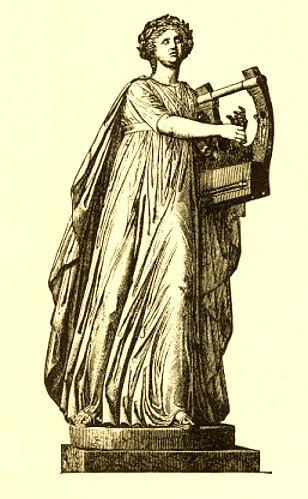
These are quotations for the year 2004. For other years, go back to the first quotation page for the Index to Quotations.

Illustration: Apollo, patron god of music, plays the lyre, the instrument with which the bard accompanied himself as he sang of mythical stories or the news of the day.
Archived quotations of the month |
|
Beginning with September, 2004, my home page will feature a different quotation from Classical or other literature each month, appropriate to the season or to current events. Starting in October, 2004, these pages will contain "Quotations of the Month" from previous months. Translations are my own, except where otherwise noted. Below is the index to the quotations for 2004, followed by the quotations themselves. |
Index to quotations for 2004 |
Below are quotations for the year 2004. For other years, go back to the first quotation page for the Index to Quotations or click on one of the years below:
Quotations of the Month for the year 2004
Click on a link to read each quotation
2004
- November '04: Election Day (Aristophanes on the Bloviating Politico),
- October '04: "Doublespeak" and government propaganda (Thucydides),
- September '04: a lament for the war dead from Aeschylus ("Ares the moneychanger" exchanges live warriors for urns of dust).
Election Special Quotation (Aristophanes), Nov. 2, 2004 |
"The Bloviating Politico..."
By Zeus, I too dreamed! It seemed the goddess Athena herself
Came down from the Acropolis, with an owl perched on her shoulder;
She poured divine ambrosia over your head from a jar, O Good Citizen,
But over the head of the Blustering Politician she poured garlic pickle!
Aristophanes, Knights, 1092-1095.
The Athenian comic playwright Aristophanes (ca.448-ca.380 B.C.) has become particularly famous in our era for his anti-war play Lysistrata, in which the women refuse to have sex with their husbands until they stop making war. But as this quotation shows, he lampooned politics in his other plays as well, proving that he knew as well as we do the Bloviating Politico.
"Doublespeak" and propaganda (Thucydides), October, 2004 |
"Words changed their meaning..."
Words had to change their ordinary meaning and to take that which was now given them. Reckless audacity came to be considered the courage of a loyal ally; prudent hesitation, specious cowardice; moderation was held to be a cloak for unmanliness; ability to see all sides of a question inaptness to act on any. Frantic violence became the attribute of manliness; cautious plotting, a justifiable means of self-defence. The advocate of extreme measures was always trustworthy; his opponent a man to be suspected. To succeed in a plot was to have a shrewd head, to divine a plot a still shrewder; but to try to provide against having to do either was to break up your party and to be afraid of your adversaries..... Indeed it is generally the case that men are readier to call rogues clever than simpletons honest, and are as ashamed of being the second as they are proud of being the first. The cause of these evils was the lust for power arising from greed and ambition; and from these passions proceeded the violence of parties once engaged in contention.....
Thucydides, Histories III.82 (Crawley translation)
"Doublespeak," the deliberate twisting of words to make them mean "something they ain't," didn't begin with George Orwell and 1984. (In fact, Orwell didn't even use the word that is frequently attributed to him, although he did coin "Newspeak" and "Duckspeak.") Nor did the practice begin with recent and current wars in Vietnam, Afghanistan, and Iraq or with modern political campaigns. Thucydides (471?-400? B.C.) was writing about the Peloponnesian War between Athens and her allies and Sparta and her allies, in which he participated. During the fifth century B.C., Athens morphed from a democracy into the Athenian Empire, overextending her forces and ambitions. Athens reached a tragic low point in the disastrous expedition against Syracuse, eventually losing the war.
Lament for soldiers who have died in war (Aeschylus), September, 2004 |
"Ares the moneychanger of the bodies of soldiers..."
Ares the moneychanger of bodies,
holding the scales in the battle of the spear,
from the fires of Ilium
sends back to loved ones the heavy
much-wept dust, filling
with ashes instead of men
the well-laid out funeral urns.
Aeschylus, Agamemnon 438-444
These words, translated from the Greek, are from one of the great choral odes in the play Agamemnon by Aeschylus (525-456 B.C.). Ares, the god of war, is the great moneychanger, exchanging men for dust. The war was the ten year-long Trojan War, from which Agamemnon returned, only to be murdered by his wife Clytaemnestra.
The quotation is particularly apropos, since, as of this week,
over 1000 U.S. soldiers, hundreds of coalition forces, and over
20,000 Iraquis have died in what seems to be an exit-less war in Iraq.
---- Go back to first Quotations page
Copyright © Cora Angier Sowa. All rights reserved.
 Send e-mail to Cora Angier Sowa.
Send e-mail to Cora Angier Sowa.
 Return to Minerva Systems home page.
Return to Minerva Systems home page.
Last Modified: